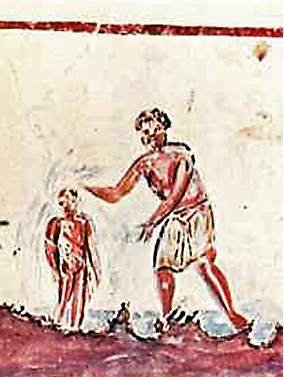
Part of a series on Baptism in Depth.
Growing up as an Evangelical Protestant, I didn’t have much of a theological foundation. But if there was any doctrine that I knew well and understood, it was Original Sin: Because Adam and Eve chose to reject God and sin, we have all inherited a fallen nature, such that we have no power in ourselves to resist temptation: we do the thing we do not want to do, and the thing we want to do, we do not do (Romans 7:15). I always thought this was an essential, universal Christian understanding — the reason why we need a Savior.

The first time I encountered someone rejecting the doctrine of Original Sin, I thought it was the bizarrest thing I’d ever heard, and presumed that it must be an isolated dissenter, an overzealous Bible student carried away with his own interpretation. That was some months ago. But since then I’ve encountered Evangelical after Evangelical — whole denominations, in fact — who deny this central tenet of the Christian faith. I remain stunned and puzzled.
Historically, the denial of Original Sin has been associated with the heresy of Pelagianism. This entails that we don’t have a fallen nature — that we, in our own ability, are entirely capable of resisting temptation and avoiding sin, and we can approach God and attain to salvation on our own without the aid of His grace. If we are to believe that Adam’s sin did not result in a fallen nature for all humanity, that men today have no greater a propensity to sin than Adam in his original state, that we can choose in our own free will alone not to sin — then ultimately we are left to wonder why Jesus needed to die for us at all. Couldn’t he simply have beckoned for us to come to Him, if there were no insuperable divide between God and Man to bridge? I do not think — I sincerely hope not — that those who deny Original Sin mean to argue this. My sense is that these people fundamentally misunderstand what Original Sin means — that they don’t understand what they are rejecting.

What they actually intend to reject, I suspect, is what they understand of the Catholic Sacrament of Baptism. The people I’ve talked to who have expressed a rejection of Original Sin have spoken of it as if it were something physical or biological that needed to be physically washed away, as one would wash away dirt or a stain. It is true that we, from the Church Fathers forward, often speak of Original Sin as a “stain” or “contagion” — but this in no wise entails one of a physical or biological sort. As it so often is with sacramental theology, non-Catholics are unable to make a distinction between something being physical and something being real. I have been around in circles so many times in discussions with non-Catholics, they not grasping that something can be both spiritual and real; both symbolic and actual; both through faith and through action.

St. Peter tells us that “Baptism … now saves you, not as a removal of dirt from the body but as an appeal to God for a good conscience, through the resurrection of Jesus Christ.” (1 Peter 3:21). In contrast to what I’ve often been told, Catholics do not ignore this Scripture, or any Scripture at all. We have never argued that Baptism works physically to remove physical sin from the body. Sin, both original and actual, is a spiritual affliction to the soul. St. Paul calls Baptism “the washing of regeneration and the renewal of the Holy Spirit” (Titus 3:5) and “[a cleansing by] the washing of water with the word” (Ephesians 5:26). St. Luke tells us that Baptism “[washes] away our sins” (Acts 22:16). But none of these statements means to imply that we obtain remission from sins by means of a physical washing alone. Many Protestants argue, then, that these references are symbolic, or that they don’t refer to Baptism at all. But then, why are the multiple New Testament authors so insistent on this language of a washing? Why did the earliest extrascriptural Christian writers understand, to the exclusion of any purely symbolic interpretation, that Baptism itself somehow washed away our sins?
This all goes to the very heart of why I began this series: the rejection of infant Baptism by many of the same Christians who affirm the sacramentality of Baptism (i.e. that it actually washes away sins). The reason why they do is that they also reject Original Sin. If a Christian believes in both Original Sin and the sacramentality of Baptism, he cannot in good conscience deny that Sacrament to his children.
I had planned to dig a bit deeper into Scripture with Original Sin this time, but I got sidetracked by exegesis of 1 Peter 3:21 — which turns out to be a very meaty verse for this discussion, full of exegetical controversy. So I want to devote a whole post to that verse, either next time, or after I give an exposition of Original Sin in the writings of St. Paul. Stay tuned; I’m excited about this!
Such a good post, dear friend – and I am glad of the side-tracking 🙂 Look forward to more 🙂 xx
Thanks so much, dear friend. 🙂
Another reason that I’ve heard is; infants shouldn’t be baptized because they aren’t able to have faith. It’s kind of funny because often times children have more faith than adults, and if faith is the work of the Holy Spirit then who is to say that infants don’t have it?..
Yes, that’s one of the major arguments. And I’m sure not all practitioners of “believer’s baptism” or “credobaptism” deny original sin (the Reformers certainly didn’t). But the majority of the people who reject “paedobaptism” also reject the sacramentality of baptism (thinking especially of the Baptists). To the best of my knowledge, no Christian group affirms the sacramentality of baptism and at the same time denies infant baptism, unless they also deny original sin.
How does the doctrine of original sin deal with Dt. 24:16 and Ezek. 18:19, 20? Don’t you think those verses suggest that we are not guilty of our sin nature until we actually commit sin against God?
Couldn’t it be that although we are indeed born with a natural propensity to sin, we are not held accountable for that until it comes to fruition in our lives?
I’ll deal with this more in my next post. Thanks for pointing out these verses; I will be sure to address them. But as I said in the post above, I think you’re misunderstanding what original sin is. Original sin is not an imputation of the guilt of the sin of Adam on his descendants. No one is being punished, per se, for Adam’s sin. It is rather a state that Adam’s descendants are affected by because of his first sin: because his sin brought death into the world (Romans 5:12, 15, 18, 19 etc.), all men have a fallen nature. As the Catechism puts it, original sin is “the transmission [to all mankind] of a human nature deprived of original holiness and justice. … Original sin is called ‘sin’ only in an analogical sense: it is a sin ‘contracted’ and not ‘committed’—a state and not an act” (CCC 404). Yes, Romans 5:12 says that “death spread to all men because all men sinned” — but what people I’ve talked to who deny original sin seem to fail to recognize about Romans 5 is Paul’s unspoken implication: That Adam’s sin brought about a state of affairs in which all men would sin. If man did not have a fallen nature, why would that be the case? Why wouldn’t some men choose not to sin? My question to you: Do you really mean to argue, by denying original sin, that man does not have a fallen, sinful nature?
Paragraphs 396 through 412 in the Catechism of the Catholic Church deal with original sin in more detail than I can here. But I think you’ll find it informative.
The problem I have with the phrasing of original sin is where you say it is a sin “contracted and not committed”. This is a slight of words that must be done to make the doctrine work. Sin is an act that I do, not something that gets passed onto me. Do the verses I referenced not make it clear that you do not contract sin?
If it is not an imputation of the guilt of Adam, as you say, then why require infants to be baptized?
I am not claiming that man does not have a fallen, sinful nature. But stating that says little more than the fact that all men will sin. We all at one point make a purposeful choice in rebellion of authority (God in this case). In fact, I cannot sin until I am able to choose to act in rebellion. This occurs for all mankind at an early age in life, but certainly not in infancy.
It still seems that you are misunderstanding. Original sin is not a sin, in the sense you are using that word (which is what we call actual sin, a sin committed, which, as you say, can only be chosen). I think the term “original sin” itself is tripping you up. The doctrine is called “original sin” because that is what it’s called. We may as well call it “fallen human nature” or “deprivation of original holiness.” And, as Ken said below, the verses you cited have nothing to do with original sin. These verses have to do with the sins of fathers (not) being imputed to their children — which is not what original sin is. Children are not punished for the sins of their fathers.
If I am understanding you correctly, you do seem to be denying that man has a fallen nature. You state that that term means nothing more than the fact that all men sin, and that we all at one point make a purposeful choice to rebel and sin. But do we have to? Can we choose not to ever sin, if that choice is entirely in us?
Let’s back up. God created Adam and Eve, in a state of original holiness and justice, in which they knew no sin — they did not rebel from God. But then they chose to rebel from God — and that has brought about a state, as Paul insists, in which all men sin. Do you not see that there is a fundamental difference between the human nature with which Adam was born, and human nature with which each of his descendants is born? Why is that?
You seem to be presuming that Baptism does nothing but wash away actual sins, for the forgiveness of sins we have actually committed. But as part and parcel of the very same argument Paul is making in Romans 5, he tells us in Romans 6 that in Baptism, “our old self was crucified with Christ so that the sinful body might be destroyed, and we might no longer be enslaved to sin” (Romans 6:6). This is not just the remission of actual sins, to which Paul does not even refer here. He describes a death to sin which changes our fundamental nature, to bring us to a life in Christ through which “we who died to sin [do not] still live in it” (Romans 6:2).
Infants must be baptized because they have contracted this fallen nature — which is not actual sin, but a corrupt state, a deprivation of the original holiness with which man was supposed to have been born. As Paul says, we who are baptized die to sin, so that we are raised with Christ, and sin no longer rules over our bodies.
P.S. Be sure you see Ken’s response to you below.
Neither of those verses relate to original sin. I can’t speak too much on the Deuteronomy verse, but having just recently done an academic exegetical study of that particular section of Ezekiel, Ezekiel 18:19-20 is a promise/command that addresses a specific problem in the exilic community.
The exiles believed that they were being punished for the sins of their parents, which was out of their control. Because of this, they believed that nothing they did for or against God actually mattered, and that there was no salvation for them, since it wasn’t their fault anyway. And if nothing they did mattered, why not do all the fun things they weren’t allowed to do?
God’s message was the opposite–they weren’t being punished for something out of their control, their parents’s sins. They were being punished for their own. Which meant that salvation was possible for them, and that the way they treated God and each other did indeed matter. It was a call back to God and a call to reconciliation.
This is why I strongly dislike taking one or two verses out of the Bible and using them as complete arguments. Because I can pull out a verse that directly contradicts both the Deuteronomy and Ezekiel verses–Exodus 20:5-6 “You shall not bow down to them or worship them; for I the LORD your God am a jealous God, punishing children for the iniquity of parents, to the third and the fourth generation of those who reject me, but showing steadfast love to the thousandth generation of those who love me and keep my commandments.” God’s word can only be heard by hearing the whole thing and keeping each part in that context.
Ken, I’m completely fine with your exegesis of Ezekiel. You’re right of course that he was speaking to the exiled community. So then, do you believe that the principle which God described, that “The son will not bear the punishment for the father’s iniquity, nor will the father bear the punishment for the son’s iniquity” applies to only those people and only at that time? Of course he was teaching those people a specific lesson, but in doing so we learn a characteristic of God’s judgement.
Regarding your Exodus reference, you’ll notice the end of verse 5 and the beginning of verse 6 make it clear that those “generations who reject me” will continue to reap the iniquity of the first generation that rejected Him, but steadfast love will come to the generation which loves Him and keeps his command. I see this as entirely consistent with Ezek. 18:20.
The principle that God is using in Ezekiel does still hold true today, not because two verses in Ezekiel say so, but because those verses are part of a larger story throughout the Bible and history that support them.
The sin nature is a condition inherited by all mankind that is a result of Adam’s sin. It is a proclivity to sin (a thought and action contrary to Gods nature) that only becomes manifest once one comes to a level of self cognizance to understand good from evil. This is why baptism of babies is not congruent to the issue. They are innocent of thoughts and actions even though they have an inherited sin nature yet to become manifest. Christ died for our sins (paid the penalty) as well as crucified our sin nature on the cross. However, in order to be saved one must have the faith that is like unto a cognizant child, one who is finally able to make a choice to believe and thus receive. No man born in this world is born without inheriting a nature that is contrary before God (a sin nature), but sins cannot be committed by those who are yet capable to have thoughts that are self aware in recognizing what is right let alone what is contrary.
The sin nature becomes positionally crucified before the Father once one becomes born again, inheriting a new nature. It is not eradicated, at least not yet, until a believer is glorified. However, the new nature becomes the actual nature of the individual, even though a battle between the sin nature and the new nature does ensue. A believer is meant to reckon the sin nature as being dead, a recognition of what God the Father eternally recognizes from divine viewpoint.
The fact that all men sin, by its universal nature, correlates to the fact that man’s free will is always informed by his nature, whether they are cognizant of this fact or not. Yet the law written on every mans heart does bear witness by the conscience that indeed all have some form of guilt due to some self failure, a guilt that confers to the fact of having fallen short of Gods glory. Yet for a believer, all sins were effectively paid for once and for all. They still are accountable to walk in the light since progressive sanctification is the only means we are to mature and grow in His Grace and knowledge, in being conformed into His image by being transformed in the renewal of the mind. To not do so, and become rebellious, would subject one to be chastised by their loving Father. The sin nature will always remain until we go home to be with the Lord, but we do not have to live under its power since we always will have the provision of the Holy Spirit. The unsaved, however, do not have that provision. That’s why the importance of sharing the Gospel.
God has always wanted us to move in a forward direction to bring peace on Earth. And the longer we wallow in sin pulls us farther from the peace we longingly want and away from God. Check my blog The Consequences of the Original Sin hope this will enlighten us.